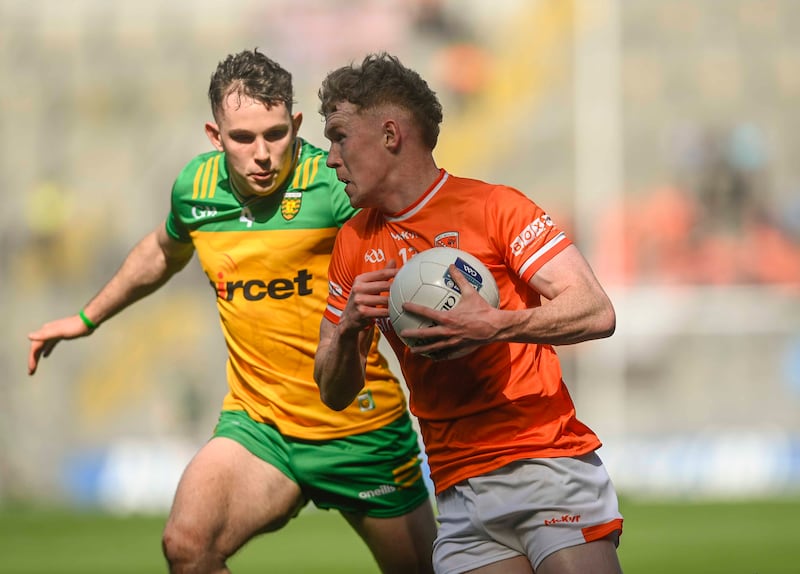TAP, tap, tap go the keyboards.
It’s quiet now on level seven.
The cold has taken hold, forced even the hardened hacks indoor to sit beneath the half-lit frames of Brian Carthy and Ger Canning and the TG4 lads.
The magic dust has settled.
Settle, now, your soul.
Sport is a funny creature.
Just about every third week an existential crisis comes along and you think to yourself that there has to be something more to life than chasing a bag of blown-up leather.
You can’t leave it go.
“So please, be tolerant of those who describe a sporting moment as their best ever. We do not lack imagination, nor have we had sad and barren lives; it is just that real life is paler, duller, and contains less potential for unexpected delirium,” wrote Nick Hornby in Fever Pitch.
While his character’s beloved Arsenal were out there boring the world half to death, Croke Park was in thralls.

Kieran McGeeney will have been sullen on his way home on Sunday evening after his side’s defeat by Donegal in the curtain raiser.
He has long decried the standard and tenor of punditry around the sport, believing its negative spiral to have a kind of Streisand Effect on the sport. If we keep telling the world how shit it is, then is it actually just shit?
Some days it is. But every sport is.
You couldn’t have looked at half of the Six Nations this year for wanting to scrape your eyeballs out with a rusty nail.
“You sometimes wonder, are the lows lower than the highs are high?” wondered David Clifford aloud in a rare interview recently with the lads on The Football Pod.
He was talking about the winning and the losing, but he might well have been discussing the country’s relationship with the sport.
Later this week, Jim Gavin and Jarlath Burns will meet the press to discuss their ongoing work for the Football Review Committee, a title that’s surely been recycled from a small bag of acceptable committee names.
The weekend just past will change the question. Do we really need to change all that much?
But the provincial championships are coming down the track. Airtime will need filled because the mismatches are on their way.
There’s an in-built irony that if you force a more offensive game upon the Limericks and Longfords of this world and make them play Kerry and Dublin, the trouncings could become crimes against humanity.
It’s all attitudes, really.
What we got for the last 15 minutes of the Division Two final and the whole 90-plus of the Division One decider were games that showcased the absolute best of Gaelic football.
That relied on two key factors: Well-matched teams and attitudes.
It took for Armagh to go four down for a game to really break out against Donegal. Up until then it had been very safe, very structured, very samey.
Having rained ball on top of a stronger full-back line in the Athletic Grounds a month ago, Armagh never really went about exposing the absence of Brendan McCole by putting Ciaran Moore into a direct contest with Andrew Murnin.
Donegal were as guilty, playing no different for the first 55 minutes, but it was Armagh whose hand was forced by the deficit.
They could have easily won as they lost, but that they keep on losing these tight games – last year against Monaghan, the Ulster final of ‘23, Galway the previous year – builds a small catalogue of evidence against their credentials.
Dublin and Derry served up what has to be the greatest league final of all time.
Just two weeks ago Peter Canavan called for them to be thrown in an arms dump. And the queue formed behind his banner, these afternoons considered superfluous against championship needs.
Guilty, Your Honour, throw the key away.
Rash judgements are the birth-right of any GAA fan.
And so we’ll all rush blindly down this alley now, proclaiming football to be the man that Jesus healed of leprosy once upon a time. It’s cured, it’s saved, on with your lives.
The leprosy was nowhere to be seen on this one, but it will be back before the summer’s out. Somewhere along the way, two teams will serve up a turd biscuit and, hell, football is broken again.
We have to reserve that right to say something isn’t good if it isn’t good. Otherwise what’s the point in any of it?
If you’re asking Jim Gavin, head of the Football Review Committee, what he wants Gaelic football to look like then surely he just pulls up the MP4 file of Dublin-Derry, turns down the lights and leans back in his chair.
If you’re asking Jim Gavin, former Dublin player, former Dublin manager, if he’d rather protect his former team from playing like they’re facing Donegal 2014 all over again, then the answer might be different.
Each and every one has his own bias.
No matter which stitch of football they pull at, a knot will appear from somewhere. It will never be perfect, because no sport is, but that doesn’t mean we stop trying.
Games like Sundays are what we want but very few teams can provide them. The combination of that level of conditioning, quality and tactical awareness on both sides is so high that to expose two-thirds of the country’s teams to a sport that has to look that way would only be to encourage kicking-in sessions.
Is that a price worth paying so that when the better teams do come to face off, it has to look like this? Perhaps.
Will we ever get it right?
Or is right already, and we just don’t know it?








